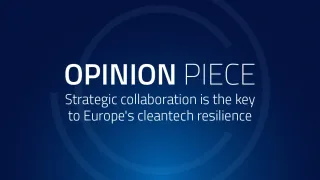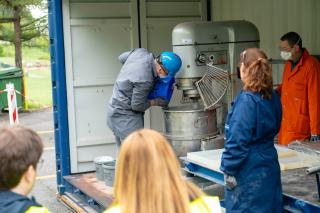Strategic collaboration is the key to Europe’s cleantech resilience
Strategic collaboration is the key to Europe’s cleantech resilience

Op-Ed by Peter Tom Jones, KU Leuven Institute for Sustainable Metals and Minerals (SIM²)
In the last few months, troubling news has emerged about cleantech icons such as Swedish battery producer Northvolt and Belgian company Umicore, which manufactures NMC battery cathode materials (CAM) and recycles NMC batteries. In June, Northvolt lost a €2bn contract with BMW due to production delays, leading BMW to switch to South Korean Samsung SDI. Earlier this month, Umicore halted its $2.7bn cathode material plant project in Canada, citing declining demand forecasts, while also postponing its previously announced battery recycling plant to 2032.
Until recently, debates about Europe’s struggling EV value chain focused on the threat of cheaper, heavily subsidised electric vehicles from China and the lack of supply security for critical materials needed by European EV battery companies. This was partly what led to the creation of the Critical Raw Materials Act (CRMA), mandating Europe to develop new domestic mines and refineries for energy transition metals.
However, the recent troubles faced by these midstream giants highlight Europe’s deepening issues, one of which is the fact that even European car manufacturers are increasingly opting for cheaper Chinese LFP batteries over the more efficient and recyclable NMC batteries.
If more OEMs suddenly decide to switch from NMC to LFP batteries —effectively allowing Chinese EV players to dictate technological choices—it will have devastating consequences for all upstream and midstream links. Additionally, the rapid pace of innovation in EV battery systems is an order of magnitude faster than the time needed to set up a vertically integrated mine-to-NMC battery/EV value chain, posing further challenges to the European economy.
De-siloing the issue
Europe is highly vulnerable due to the fragmented and short-term focused nature of its mine-to-EV/cleantech supply chain.
Above all, Europe needs more strategic alignment between upstream, midstream, and downstream players in the mine-to-EV/cleantech value chain, abandoning silo thinking in favour of a long-term strategy. Building a robust, sustainable supply chain for NMC-based electric vehicles requires coordinated efforts among European mines, refining plants, pCAM/CAM factories, battery cell producers, assembly plants, and EV manufacturers. This de-siloed, vertical integration is necessary because the era of neoliberal, trade-based globalisation has come to an end.
Investors also need to get involved in this long-term strategy, sticking with certain choices as a sailor does when confronted with winds and waves, rather than showing this stop-start behaviour we are seeing now.
Essential measures to support the European EV value chain
As Ann Mettler, VP of Breakthrough Energy, puts it: we no longer live in the 1980s – so it does not make sense to keep promoting an open trade policy that allows subsidised products from abroad into our markets while being overly strict on state aid at home.
We now live in a “post-Western world” where protectionism and resource nationalism are on the rise, while the rule of law and liberal democracy principles are under attack.
Europe must emulate China’s success over the past decades by taking control of its cleantech production chains. To support made-in-Europe EV/cleantech chains, several measures are necessary, including establishing a minimum content of made-in-Europe or recycled materials, providing output-based OPEX support, while implementing trade defence mechanisms against ESG-unfriendly imports of metals, batteries, and cleantech products.
Additionally, stable and lower energy prices, faster and predictable permitting procedures, green public procurement with ESG/made-in-Europe criteria at its core, favourable tax rates for leasing cars, and social leasing formulas for the broader public are essential.
The new European Commission will have to take a different approach. With the announced Clean Industrial Deal, there is hope for improvement. But it must be aimed, among other things, at stimulating (at least partially) made-in-Europe EV/cleantech production, including future recycling. This requires a sustained, integrated long-term strategy, driven by technological choices based on smart eco-design, from cradle to grave. This is the case with NMC-based EVs, which have sufficient intrinsic value to thrive in a circular economic model.
Peter Tom Jones
Jones is the Director of the KU Leuven Institute for Sustainable Metals and Minerals (SIM²), leading a team of 400 researchers focused on sustainable energy-transition metals. With over 20 years of experience, Jones completed his PhD in Metallurgy at KU Leuven in 2001 and co-founded the SOLVOMET Research & Innovation Centre, specializing in hydrometallurgy. He has coordinated or partnered in over 30 EU-funded projects on sustainable metallurgy and critical raw materials. Jones is also the author of several books on climate and circular economy and produces documentaries on Europe’s mine-to-cleantech value chains.
Jones was a speaker during the session “Race to achieve energy security” at this year’s Raw Materials Summit, organised by EIT RawMaterials. This OpEd is based on his contributions. The next summit is scheduled for May 13-15, 2025. www.eitrmsummit.com



